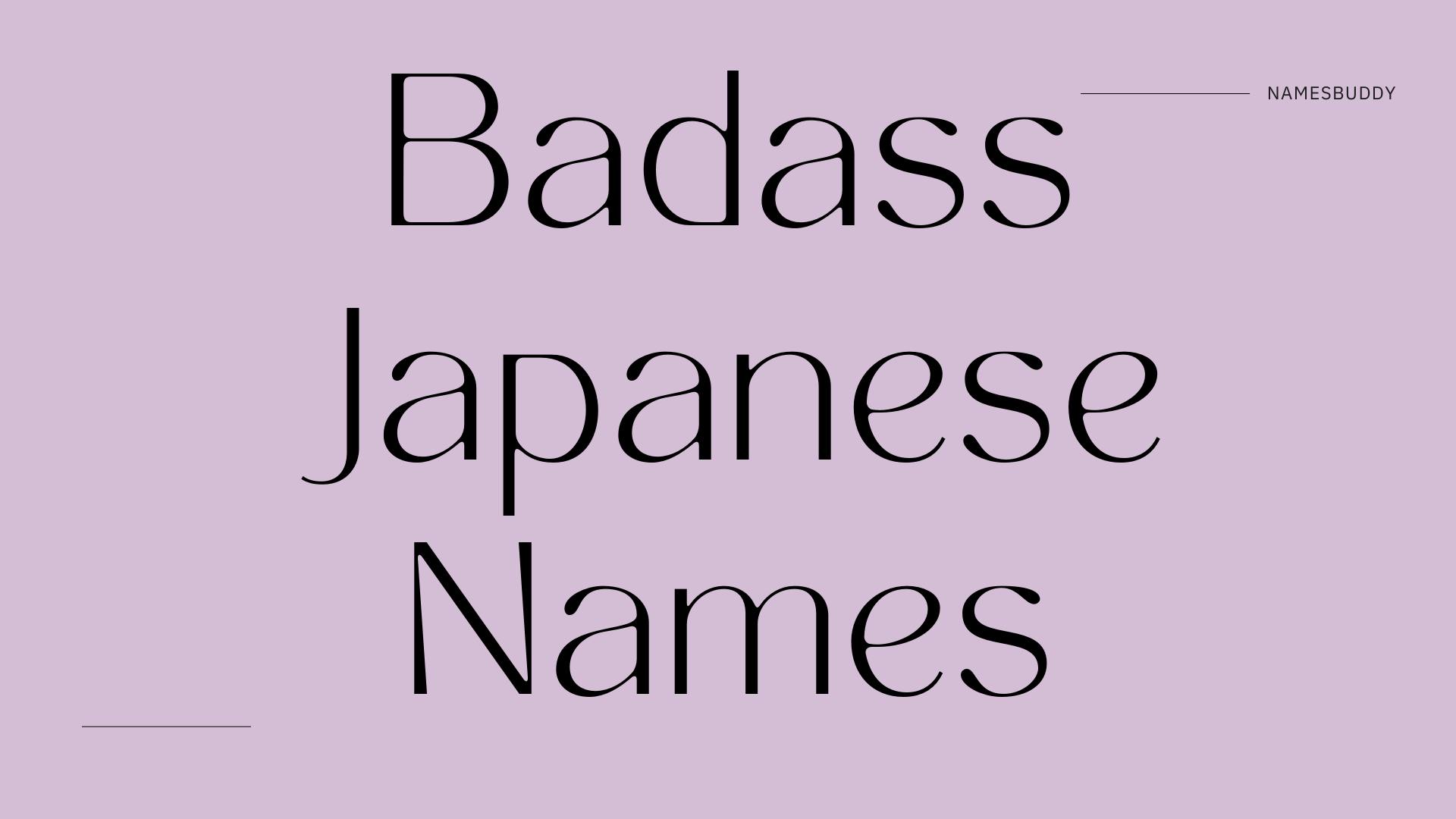Have you ever wondered why some Japanese last names sound so ominous? Well, buckle up because we're diving deep into the world of Japanese surnames with dark meanings. These aren't just random strings of characters; they carry centuries of history, culture, and sometimes, a touch of the macabre. Prepare to have your mind blown as we explore the fascinating and sometimes eerie world of Japanese surnames.
Japanese names often reflect the natural world, places, or even virtues. But what about those that seem to carry a darker tone? Some of these names might sound unsettling when translated into English, but they often have deep cultural and historical significance. Let's uncover the mystery behind these surnames and see why they continue to intrigue linguists and culture enthusiasts alike.
In this article, we'll delve into the origins, meanings, and cultural implications of Japanese last names that might make you raise an eyebrow. We'll also explore how these names fit into modern Japanese society and whether their dark connotations still hold weight today. So, let's get started, shall we?
- Work Caption Ideas Boost Your Social Media Game With Killer Captions
- Flirty Good Morning Meme Start Your Day With A Spark
This article is jam-packed with insights, so here's a quick guide to help you navigate:
- The Historical Roots of Japanese Last Names
- Japanese Last Names with Dark Meanings
- Cultural Impact and Perception
- These Names in Modern Society
- Famous Figures with Dark Surnames
- Translation Challenges
- Psychological Effects on Bearers
- Popularity Trends
- Myths and Legends
- Conclusion: Embracing the Dark Side
The Historical Roots of Japanese Last Names
Japanese last names have a rich history that dates back centuries. In the early days, most people didn't have surnames. It wasn't until the Heian period (794-1185) that the practice of using family names became more widespread, especially among the nobility and samurai classes. These names often reflected the family's occupation, location, or a notable characteristic.
As society evolved, so did the naming conventions. By the Edo period (1603-1868), commoners were also encouraged to adopt surnames. This led to a diverse array of names, some of which carry meanings that might seem ominous today. But why did these "dark" names come about? Let's explore further.
- Boyfriend Good Morning Prayer For Him Start His Day With Love And Faith
- Funny Sayings For A 30th Birthday Laughter Milestones And Quirky Wishes
Origins of Dark Surnames
Some Japanese last names with dark meanings stem from geographical features, historical events, or even supernatural beliefs. For example, names related to death, darkness, or danger might have been given to families living in areas prone to natural disasters or near burial grounds. Others might have been chosen to ward off evil spirits or to honor ancestors who faced adversity.
Let's take a look at some examples:
- Kuroiwa: Translates to "black rock," possibly referring to a dark or ominous landscape feature.
- Kurayama: Meaning "dark mountain," this could indicate a location shrouded in mystery or danger.
- Shinigami: While not a common surname, this word means "death god" and is often associated with death and the supernatural.
Japanese Last Names with Dark Meanings
Now that we've set the stage, let's dive into some specific examples of Japanese last names that carry darker connotations. These names might sound eerie when translated, but they often have fascinating stories behind them.
Exploring the Shadows
Here are a few names that might make you pause and ponder:
- Kageyama: Meaning "shadow mountain," this name could evoke images of mystery and darkness.
- Kurokawa: Translates to "black river," possibly referring to a river with dark, murky waters.
- Akuma: Meaning "devil" or "demon," this name is rare but carries a powerful and ominous meaning.
While these names might sound unsettling, they often have deep cultural significance. Let's explore how they fit into Japanese society.
Cultural Impact and Perception
In Japanese culture, names are more than just identifiers; they carry meaning, history, and sometimes, superstition. Names with dark meanings might be viewed differently depending on the context. For example, in literature and media, these names might be used to evoke a sense of mystery or foreboding.
However, in everyday life, people with such names might face stereotypes or misconceptions. It's important to remember that these names often have historical or cultural significance that goes beyond their literal translation.
Stereotypes and Misconceptions
Some people might assume that a name with a dark meaning reflects the character or personality of the bearer. This couldn't be further from the truth. In fact, many people with these names take pride in their heritage and see their surname as a testament to their family's history and resilience.
These Names in Modern Society
As Japan becomes more globalized, the perception of these names is evolving. Younger generations might view them with curiosity or even admiration, seeing them as unique and distinctive. In some cases, these names might even be seen as trendy or edgy.
However, challenges remain. Some people with dark-sounding names might still face bias or discrimination, especially in professional settings. Efforts to educate the public about the cultural significance of these names are ongoing.
Changing Perceptions
Modern Japanese society is increasingly embracing diversity and inclusivity. As more people learn about the history and meaning behind these names, attitudes are slowly shifting. This shift is reflected in media, literature, and even popular culture, where characters with dark names are often portrayed as complex and multifaceted individuals.
Famous Figures with Dark Surnames
Throughout history, there have been notable figures with last names that carry dark meanings. These individuals have made significant contributions to various fields, proving that a name doesn't define a person's character or potential.
Notable Examples
Here are a few famous figures with dark-sounding surnames:
- Kuroda Nagamasa: A renowned samurai and military commander during the Sengoku period.
- Kawakami Otojirō: A pioneer of modern Japanese theater, known for his innovative performances.
- Kurosawa Akira: One of Japan's most celebrated filmmakers, known for his masterpieces like "Seven Samurai" and "Rashomon."
Translation Challenges
Translating Japanese names into English can be tricky, especially when dealing with names that have dark meanings. Literal translations might not always capture the true essence of the name, leading to misunderstandings or misconceptions.
For example, the name "Kuroiwa" might be translated as "black rock," but its cultural significance goes beyond its literal meaning. It might refer to a specific geographical feature or historical event that is lost in translation.
Cultural Nuances
Understanding the cultural nuances behind these names is crucial for accurate translation. Linguists and cultural experts often work together to ensure that translations reflect the true meaning and significance of the names.
Psychological Effects on Bearers
For those who bear names with dark meanings, the psychological effects can vary. Some might feel self-conscious or embarrassed, while others might embrace their name as a source of pride and identity.
Research has shown that names can influence how people perceive themselves and how others perceive them. However, it's important to remember that a name is just one aspect of a person's identity.
Embracing Identity
Many people with dark-sounding names have found ways to embrace their identity and turn it into a positive attribute. By educating others about the cultural significance of their names, they help break down stereotypes and promote understanding.
Popularity Trends
While names with dark meanings might not be the most popular choice for parents today, they still hold a certain allure. In some cases, these names might even be seen as trendy or edgy, especially among younger generations.
Data from recent years shows a slight increase in the popularity of unique and distinctive names, including those with darker connotations. This trend reflects a growing appreciation for diversity and individuality in naming practices.
Modern Trends
Modern parents are increasingly drawn to names that stand out and have a unique story behind them. Names with dark meanings might fit this criteria, offering a chance to connect with history and culture in a meaningful way.
Myths and Legends
In Japanese folklore, names often play a significant role in myths and legends. Some stories feature characters with dark names who embody certain virtues or qualities. These tales serve as a reminder that names can carry powerful meanings beyond their literal translations.
For example, the legend of the "Kurokami" (black hair) tells the story of a mysterious woman with dark hair who appears to travelers in need. Her name reflects her mysterious and otherworldly nature, adding to the intrigue of the tale.
Cultural Significance
Myths and legends surrounding dark names highlight the cultural significance of these names in Japanese society. They serve as a reminder that names are more than just words; they carry stories, histories, and meanings that connect us to our past.
Conclusion: Embracing the Dark Side
In conclusion, Japanese last names with dark meanings offer a fascinating glimpse into the country's rich cultural heritage. While these names might sound ominous when translated, they often carry deep historical and cultural significance. By embracing these names and understanding their true meaning, we can gain a greater appreciation for the diversity and complexity of Japanese culture.
So, the next time you come across a name like "Kageyama" or "Kurokawa," take a moment to appreciate its history and significance. And if you have a dark-sounding name yourself, wear it with pride and share its story with others.
Don't forget to leave a comment below and share this article with your friends. Who knows, you might discover a fascinating new perspective on Japanese names!



Detail Author:
- Name : Aisha Funk
- Username : shania08
- Email : jschoen@turner.com
- Birthdate : 1983-10-14
- Address : 514 Wiza Well Apt. 907 Bednarberg, PA 03668-8719
- Phone : 1-352-646-8491
- Company : Homenick, Bailey and Bernier
- Job : Computer
- Bio : Et pariatur nisi dignissimos dicta quis cupiditate hic. Ut est dignissimos temporibus autem atque. Ipsa impedit rerum ex inventore odit.
Socials
instagram:
- url : https://instagram.com/shamill
- username : shamill
- bio : Nulla pariatur error excepturi corporis iusto earum animi. Tempore eum iusto blanditiis iste.
- followers : 5040
- following : 2552
facebook:
- url : https://facebook.com/sylvesterhamill
- username : sylvesterhamill
- bio : Harum nihil sit ducimus nulla aut repellendus.
- followers : 1347
- following : 1780
linkedin:
- url : https://linkedin.com/in/sylvesterhamill
- username : sylvesterhamill
- bio : Velit et dolores minus dolor.
- followers : 4011
- following : 1586